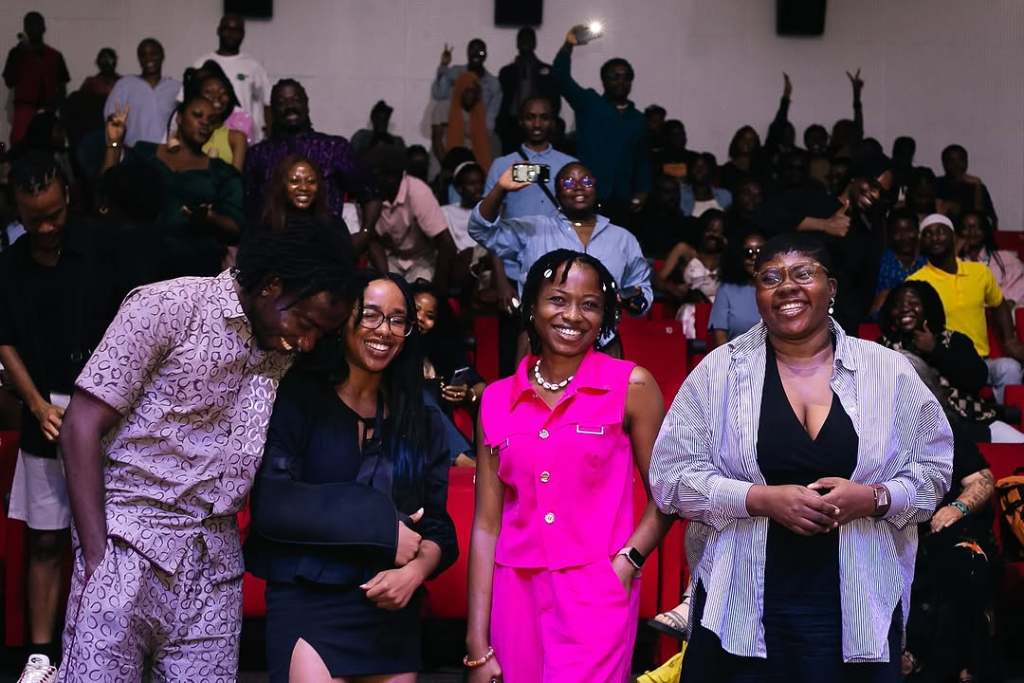
A man receives a phone call from his doctor, who tells him that he is terminally ill. He reacts with an unsettling calm, as though he had foreknowledge of this day. In the following scene, death sits across him, embodied by a spectral figure. Later, he would dance with death, carefree, and hauntingly, surrendering completely to his mortality. Everything Must End, directed by Uwana Anthony Churchy in honor of a loved one, lingers long after the credits fade. Its weighty existential themes—what we leave behind and why we are here—stay with the audience like an uninvited guest. The film is everything Nollywood typically avoids: poetic, mundane, quiet.
Everything Must End would likely struggle in Nigeria’s commercial cinema or on conventional streaming platforms. Its themes and rejection of Nollywood’s mainstream conventions are fitting for only one place—the S16 Film Festival. A sanctuary for Nigerian arthouse cinema, the festival thrives on showcasing unorthodox, deeply reflective works that challenge traditional narratives.
To the question of what Churchy thinks the festival does for filmmakers like him, he puts it simply, “S16 gives a voice to the voiceless, power to the people.”
On the festival’s fourth edition, held at Alliance Francais in Ikoyi, the venue overflows with attendees. The 120-seat auditorium is packed, with latecomers sitting on the floor as the first short of the day, Everything Lasts and Nothing Ends, begins to play. The audience, a mix of Gen Zers with a smattering of millennials, embodies the festival’s spirit: young, vibrant, and unapologetically niche. Outside the auditorium, an interactive storyboard experience invites attendees to grab a marker and complete a synopsis set in Nigeria, 2065. Above the board, the word Technologic stands out, it is the theme of this year’s festival.
“It was Abba Makama who came up with the idea, not too long after the last festival,” Michael Omonua told me.
Technologic highlights cinema’s historical transitions—from black-and-white to color, certain aspect ratios to CinemaScope, and film to digital—while exploring the rise of artificial intelligence in filmmaking. This theme also connects to broader questions about the future of cinema, a topic that reverberates throughout the festival.
What is the future of film? When rumors spread about Netflix withdrawing financial support for original Nigerian films, the industry’s overreliance on streaming platforms came into sharp focus. Even Kunle Afolayan’s swift rebuttal couldn’t entirely dispel the unease. In the intimate space of the S16 festival, a panel featuring Daniel Oriahi, Dika Ofoma, and Chuka Ejorh tackled this issue head-on. Discussions ranged from defining authentic Nigerian storytelling to the potential impact of artificial intelligence on creative work.

Dika Ofoma, whose films have been consistently featured at S16 and who won the Rising Star award this year, emphasized that an authentic Nigerian story goes beyond speaking indigenous languages. “It’s about Nigerian themes—how we show love, how we grieve, how we observe life and depict it the way we see it,” he said. Addressing the anxieties surrounding AI, Ejorh reassured filmmakers: “Artificial intelligence cannot take your place.” Ofoma echoed this sentiment, affirming his belief in the superiority of human creativity while acknowledging the utility of tools like ChatGPT.
Ejorh proposed that the future of film might be shaped more by individual filmmakers than by the industry’s broad trajectory. Looking around the room at the S16 festival, it seemed entirely plausible that some of these talents could indeed represent the crème de la crème. In the ecosystem of Nigerian cinema, two worlds coexist. On one side stands an industry that often suffocates unconventionality, where arthouse films struggle to breathe. On the other hand, indie films. This is the beauty of cinema, its profound, unapologetic diversity, and the S16 festival emerges as a critical lifeline, a sanctuary for filmmakers who dare to deviate from the established script. It is more than a platform; it is a collective whisper saying, “Our stories can be different.”
C.J. “Fiery” Obasi’s Mami Wata is a luminous example of this creative defiance. Its world premiere at Sundance—where it captured the Best Cinematography Award—was not just the s16’s collective triumph but a declaration of Nigerian cinema’s global potential. Beyond the S16 founders, a new generation of storytellers is emerging, with S16 acting as ground zero. Nneoha Ann Aligwe, whose vision probes the spiritual realm, birthed the Africa International Horror Film Fest (AIH), the first of its kind in Nigeria and the second on the continent. At the recent S16 festival, her short film, Enyo was crowned with the Viewers’ Choice Award. Another filmmaker, Dika Ofoma screened God’s Wife, a short that whipped up the most anticipation. His talent is obvious, and he took home an award to show for it.
In his latest film, Abba Makama’s The Kids Are Okay declared a promise: Nigeria’s future could be better if given the chance to breathe, much like how the S16 collective provides a platform for unconventional filmmakers. It was a documentary that was less a film and more a living portrait of Lagos’s youth. Previously titled A Mumu’s Guide to Alte, each film segment was a glimpse into the complex universe of young Nigerians. Fashion was a language, music a heartbeat, pride a shield, and spirituality a silent revolution.
As Michael Omonua noted, “There’s a new generation of filmmakers and critics emerging, intellectually curious about film and art.”
Resilience is the essence of the ‘Alte’ lifestyle. Despite the economic odds, the kids are okay—more than okay. They are a force.
Sixteen films, a fitting nod to S16’s name, cascaded across 4 days at the Alliance Francais auditorium. Each story was an act of rebellion. From the haunting landscapes of grief to the documentaries that captured youth in all its complex glory, the 2024 selection reflects a new era of storytelling. It proclaimed, without hesitation, that the future of African cinema is not something waiting on the sidelines—it has arrived, fully formed, and unapologetically brilliant. And Abba Makama, CJ “Fiery” Obasi, and Michael Omonua stand at the epicenter of giving a voice to these unconventional Nigerian filmmakers.
